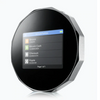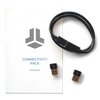Investing in digital assets, namely cryptocurrency, is one of those things everyone seems to be talking about right now, isn't it? Whatever your reasons for investing might be, not only should you be concerned about growing your investments but also protecting them.
Bitcoin, along with other digital currencies, exists on something called the blockchain - a ledger where crypto transactions happen. Sure, blockchain is thought to be highly secure and safe. However, it's not foolproof. And therefore, security breaches can still occur and often do.
In many cases, crypto theft resulted in people losing all of their digital assets from a few hundred dollars to hundreds of thousands or even millions.
If you're still finding your way around cryptocurrency and crypto wallets, it's time to get acquainted with digital security.
There are multiple steps behind ensuring that you store cryptocurrency safely and a few things you should consider, so let's begin.
5 Steps To Protecting Your Crypto Wallet
Investing your savings into digital assets is a good start but you need to protect your crypto well. We’ve compiled a list of a few steps regarding the security measures you should take in storing your crypto funds.
1. Use A Secure Internet Connection
Getting online on whatever network is available at the moment is the worst thing you could do if you want to trade or pay for something using your digital assets. The general rule is never to use public networks for trading. You should ensure that the network you're using is entirely secure.
Not even your home network is 100% secure from breaches, which is why you should use a VPN (virtual private network) to protect your crypto assets completely. VPNs change your location and your IP address, so you're more protected from security breaches while you trade or browse .
2. Consider Creating Multiple Cryptocurrency Wallets
There's generally no reason to only have one crypto wallet. You're free to sign up for as many cryptocurrency wallets as you want.
Perhaps that could be the key to keeping your assets secure, as you can diversify your crypto assets into a few wallets.
We advise you to open up an online wallet for day-to-day use and move the rest of your digital assets into a different wallet or even a few. Even if a security breach does happen and someone gets access to your wallet, you will lose less than you could have by storing all of the digital currencies in one place.
3. Change Your Passwords Regularly
It might seem obvious but you need to have strong passwords for all your accounts, especially for the accounts used for cryptocurrency exchanges. You'd be pretty shocked if you knew how many people are guilty of using the same password on multiple accounts or apps, which is just about the worst thing you can do for your crypto’s security.
So, making sure that you have a strong password is paramount but it should never be a password you use anywhere else, especially if you keep multiple wallets for crypto coins.
If you have issues remembering all the passwords, consider getting a good password manager to keep track of them.
Then, remember to change it every once in a while and turn on the two-factor authentication (2FA) or multi-factor authentication which is one of the best security practices out there.
4. Secure All Your Devices
You probably use your crypto wallets on many different devices such as your phone, laptop, iPad, and so on.
And that is precisely why all your devices need to have top-tier security to fight off hackers.
So, be sure to invest in the best antivirus software program and firewall to improve your device’s security. If your security tools are too old and your antivirus is outdated, you're making yourself a target for hackers, as they can - and will - take advantage of your vulnerable cryptocurrency wallet.
5. Beware of Phishing
Phishing scams target cryptocurrency wallets and they usually come in the form of malicious emails or even ads.
So, whenever you're making crypto transactions, make sure you don't click on anything even remotely strange or unfamiliar, as it could be the end of your cryptocurrency funds.
Spear-phishing scams are growing in popularity as well and through them hackers can empty your crypto wallet. Many of these scams are done by sending emails from fake domains or from someone pretending to be one of your coworkers and adding a malicious link for you to click on.
Once you click and they’re in, hackers can empty your online wallet within minutes.
So, be careful before clicking on any link and take extra care to check every email domain you receive an email from. Clicking on something (or opening a weird-looking email) might result in you losing all your assets.
Cold Wallets Or Hot Wallets - Which One Is The Best Option?
For some cryptocurrency investors, having a separate, physical wallet is a hassle which is why they opt to use the online wallet that is integrated into their crypto exchange platform.
That is otherwise known as a hot wallet where the custodial wallets are taken care of by the platform. Someone else - the owner of the platform - is in control, and your cryptocurrency is in their hands.
Hot wallets, which are also called "online wallets", offer investors quick access to the funds. They are very convenient, and while they cannot be stolen like a physical wallet, they're more prone to hacks which could result in you losing your assets.
So, hot wallets can be used for many different exchanges and from different locations and they can even hold all of your assets in one wallet which is convenient, but we advise against it.
On the other hand, a cold wallet isn't connected to the Internet and stores your cryptocurrency offline, which is one of the reasons why it carries far less risk. Without an Internet connection, cold wallets are virtually impossible for online crypto thieves to hack into.
While many people will argue that hot and cold wallets are on the same level of security, they're definitely not.
A cold wallet, or "cold storage," refers to storing all of your cryptocurrency in a physical hardware device. These hardware wallets are somewhat similar to regular USB sticks and require typing in the password before you can access the funds.
So, if you wish to make an exchange on the cryptocurrency market, you will have to swap or move your digital currency from cold storage to a hot (online) wallet first. Sure, this requires an extra step but it also keeps your crypto out of harm's way until you’re ready to use it.
We've mentioned before that you should aim to have multiple wallets for your cryptocurrency assets, and while this might seem like a hassle to some of you, it is the most secure way to keep your assets.
Even if someone were to get their hands on your hardware wallet, without your password or seed phrase they will have no way of entering your wallet and stealing your assets.
But what if you are trading crypto multiple times a week? Well, in those cases it's standard practice to keep some smaller amounts in the hot wallet to cover your fees while you keep most of your crypto funds in the cold storage. That way, you can perform most of your daily or weekly transactions while keeping the remainder of your crypto in a safe space.
Cold wallets are extremely safe and storing the password and seed phrase to it in a safe space, such as in a safety deposit box or a recovery seed backup tool, can give you additional peace of mind. Your private key and seed phrase never have to touch the Internet.
Tips & Tricks For Preventing Cyber Theft
Private keys being compromised is one of the worst cyber security attacks one might encounter but it’s happening more and more. Or the exchange itself might get hacked and you along with many others might lose all of your assets. So, again, one of the best tips safety-wise is to store your crypto in a cold (hardware) wallet.
Whatever exchange platforms you use, make sure it offers the options for a 2FA. Security measures such as that ensure that only you and nobody else pretending to be you can access your assets.
Some of these platforms even require two passwords and multiple authentication tools.
While you're at it, check what people are saying about the platform.
If a platform has a good reputation and the people are satisfied with it, that should be easy to find. But if it suffered a few security breaches, or worse, theft, it’s best that you continue your search for a more secure platform.
How To Protect Your Cryptocurrency - Bottom Line
There are plenty of ways to ensure your Bitcoin and other cryp assets are safe and secure on the Internet. From email accounts to private keys and public keys, every single thing must be protected during each exchange.
Our advice is to store your cryptocurrency funds in a cold wallet aka hardware wallet. The security of a hardware wallet is hard to beat because your digital assets are completely out of reach from malicious actors online.






















































